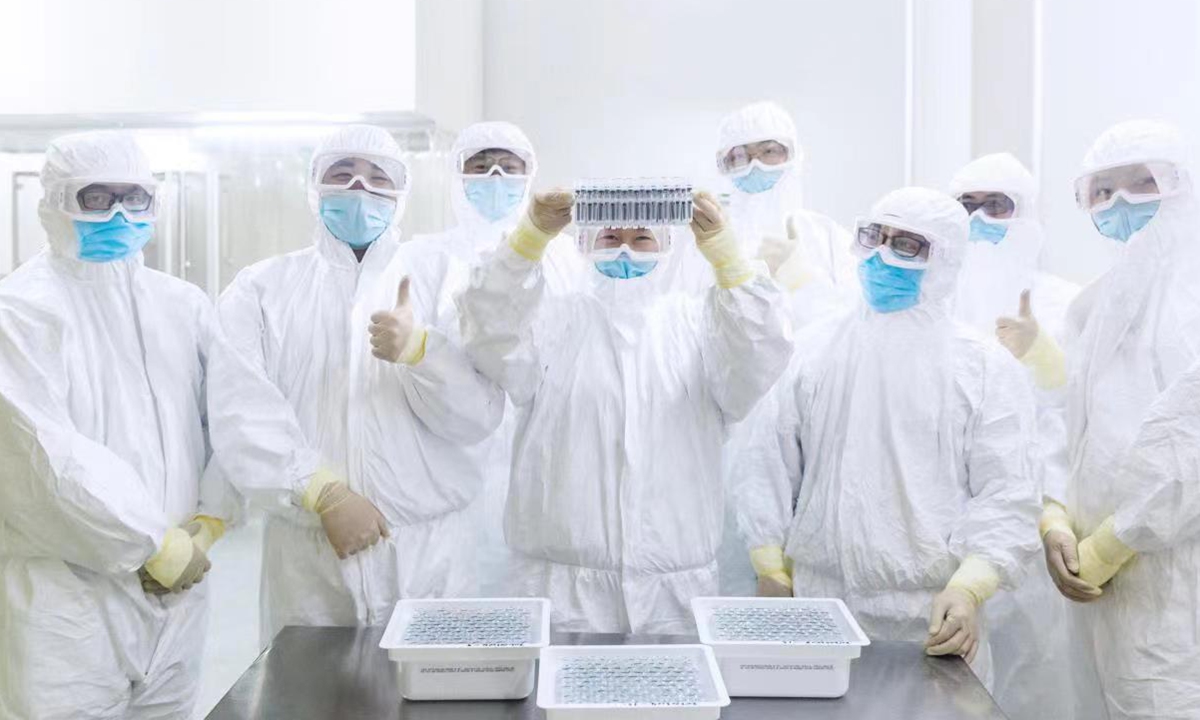
Photo: Courtesy of Sinovac
China's leading COVID-19 vaccine producer Sinovac is speeding up the development of customized vaccine targeting the Omicron variant for clinical trials or emergency use amid spiraling Omicron risk worldwide, the producer's CEO Yin Weidong told the Global Times in an exclusive interview.
Sinovac has set up 10 R&D centers around the world to launch quick research on the shots against the Omicron strain.
Through cooperation with the Chinese University of Hong Kong and other institutions, the preclinical research of Sinovac's vaccine against Omicron has basically been completed. The clinical trials applications are underway in the Chinese mainland, China's Hong Kong and Chile, as part of Sinovac's latest efforts in supporting developing countries hit hard by mutated Omicron strains.
As South Africa sees more new cases and deaths from the sub-variant of Omicron, Sinovac has strengthened vaccine supplies to developing regions such as Africa and South America, to help bridge the gap in vaccine accessibility.
The producer authorized local production of its vaccine and co-established production factories in Egypt and Algeria to support supplies and endow a scientific production technique. A Sinovac-aided automated cold storage house is also under construction in Egypt to empower it as a vaccine hub in the region, Yin told the Global Times.
Sinovac, one of the world's most used vaccines, has so far supplied 2.7 billion doses of COVID-19 vaccines globally.
"At present, the industrial competition in market is no longer crucial. How to respond quickly and solve the needs of each country is our priority," said Yin.
"That's why we stressed a global vision as we have developed 10 vaccine production bases across the world, with each base equivalent to a research center - an outpost for virus detection - that enables us to quickly detect the latest mutations and promote our next research focus. We can also assist in immunization programs customized for each area."
Amid Hong Kong's overriding task to stabilize and control the latest wave of the epidemic, the Chinese University of Hong Kong and Sinovac Biotech signed an agreement on February 18 to jointly build a Biosafety Level 3 Laboratory (P3 laboratory) at the university to conduct research in the fields of infectious diseases, immunology, microbiology and other related study areas. The collaboration is part of their co-efforts in detecting viruses, warning, and launching quick response. Sinovac also announced a 10-billion-yuan ($1.58 billion) investment in the next five years to support basic R&D in the biomedical field.
Due to the fact that the coronavirus disease is mutating much faster than expected, updated research and treatments are urgent and important, Yin said.
"The vaccine against the mutated strain has undergone little change in the manufacturing process and complexity, but has only seen the replacement of the original essential strain with the mutated strain," Yin explained. "But the accurate efficiency of the re-configured vaccines against Omicron is still under collection and analysis."
"Daily highs of Omicron infections worldwide confirm the decline in protection against this particular variant from almost all types of vaccines, even in countries with an apparent inoculation rate of more than 70 percent. That's why the Sinovac ramped up efforts to develop the vaccines targeting the Omicron strain," Yin said.
But he warned that vaccination with original-typed shots is still very necessary before the one targeted against the Omicron variant becomes available.
On January 28, a paper published in Nature said that three shots of current Sinovac vaccines can induce neutralizing antibodies against the Omicron variant and lower risks of severe cases.
Yin said Sinovac will prioritize supply of children's vaccines this year, in addition to ensuring domestic supply and booster shots' supply in countries where Sinovac vaccines have been used.
The Hong Kong government has started to provide Sinovac CoronaVac vaccination services for people aged 3 to 17 and those aged 60 or above on February 23.
Chile, which is also hit by the Omicron variant, has approved Sinovac's vaccine for use in people as young as 3 years old, after the Chilean Ministry of Health officially declared that real world data suggested the vaccine to be effective in preventing the coronavirus disease in children aged 6-11 years old.
Yin told the Global Times that Sinovac has launched Phase III trials involving more than 10,000 participants who are children between 6 months and 17 years of age in South Africa, Malaysia, the Philippines and Chile, and it has initially shown a positive safety result.
To boost vaccine guarantees in Africa, Sinovac plans to help build a fully automated cold storage house in Egypt that can store 150 million doses of vaccines, Yin said. The storage house, expected to be completed by June, will make Egypt a vaccine hub in Africa.
Earlier, Sinovac announced an investment of more than $60 million to open a research and development center in Chile and build a local vaccine production plant with an estimated annual production capacity of 60 million doses, helping the country become the vaccine delivery center of South America.
Many other Latin American countries, such as Colombia, experienced vaccine shortages early on in the pandemic, while rich countries hoarded available doses, because it lacked indigenous vaccine production lines and traditionally relied upon global health institutes for vaccines procurement. Sinovac stepped in with lower shot prices, as well as collaborations to help build domestic lines and research centers that boost employment and promote local immunological R&D capability, Yin said.




